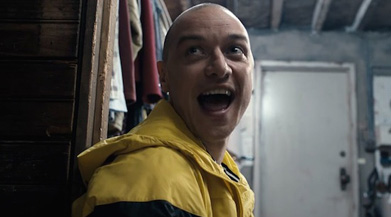The 400-Word Review: Split
By Sean Collier
January 23, 2017
BoxOfficeProphets.com

Now that’s a twist.
Because, you see, the two films that are meant to represent this supposed comeback — 2015’s The Visit and Split — are very bad. What any other viewer, let alone a professional, sees in these works is beyond me; I found bad writing and worse structure, deeply offensive themes and chuckle-inducing attempts at fright.
To each his own, I suppose.
This time: three teenage girls, Casey (Anya Taylor-Joy) chief among them, are kidnapped by a fastidious assailant who locks them in an underground bunker. In fairly short order, it turns out that their captor suffers from dissociative identity disorder (DID), and only some of his two dozen personalities mean them any harm; unfortunately, the bad personalities are running the show.
Where to begin?
First, it’s a premise that starts with junk science that only gets junkier. As he did in the equally inane The Happening, Shyamalan takes a misinformed bit of science fact and extrapolates to nonsense — not science fiction, but straight silliness. Here, that requires him first to portray DID in a preposterous, unfounded way, not as a real condition but as a cinematic trope, with dozens of people jockeying for primacy inside one body. (I won’t spoil the extrapolation, but know that it is absurd.)
We know, now, that this is not what those suffering from this disorder (previously referred to as multiple personality disorder) endure. Rather, it’s an easy narrative device for a lazy writer/director. I suppose I shouldn’t be shocked that Shyamalan eventually got to it.
More pointedly, though, this material is no longer acceptable in 2017. With The Visit, Shyamalan had the gall to demonize the elderly; here, he further stigmatizes the downtrodden, implying that the mentally ill are psychotic murderers in waiting. Such tone-deaf, apathetic tales do not merely attack those suffering from this specific condition (though that would be bad enough), they stand as an insult to all who have fought mental health issues. Once again, Shyamalan should be ashamed.
I suspect, however, he won’t be. No one with the ability to self-reflect would’ve made this movie.
My Rating: 2/10
Sean Collier is the Associate Editor of Pittsburgh Magazine and a member of the Broadcast Film Critics Association. Read more from Sean at pittsburghmagazine.com/afterdark